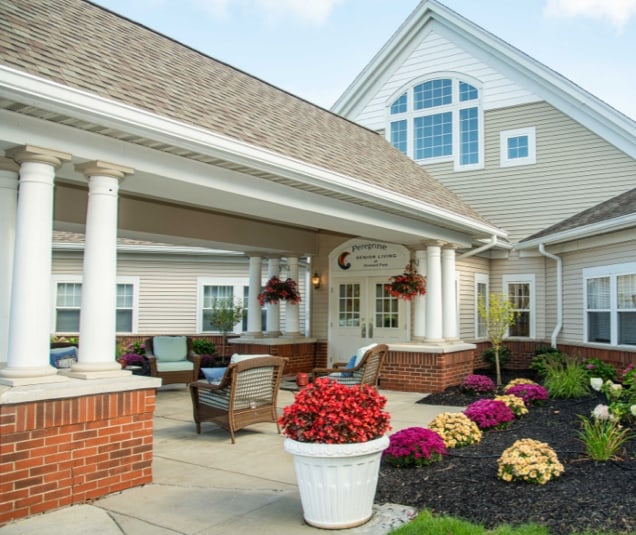Memory care and nursing homes are two types of long-term care that serve distinct purposes. Both offer round-the-clock supervision and support, but there are important differences to consider when choosing the best option for your loved one.
One key distinction between memory care and nursing homes is the focus of care—memory care specializes in supporting individuals with cognitive impairments, while nursing homes cater to a broader range of medical needs. Additionally, the level of medical support, cost, and living environment vary between the two forms of care, making it essential to evaluate these factors based on your loved one’s specific needs.
What is Memory Care?
Memory care is a specialized form of assisted living designed for individuals with Alzheimer’s disease, dementia, or other forms of memory loss. This type of care focuses on providing support specifically tailored to the needs of those with memory impairments.
In memory care communities, staff members receive specialized training in caring for individuals with memory loss. They understand how to communicate effectively with residents who may have difficulty remembering things or expressing themselves. Memory care communities also have safety measures in place to prevent wandering and other potentially dangerous behaviors.
What is a Nursing Home?
Nursing homes, also known as skilled nursing, provide 24-hour medical care and supervision for individuals with chronic or severe health conditions. This type of care is equipped to handle complex medical needs and typically has a team of healthcare professionals on staff, including registered nurses, licensed practical nurses, and certified nursing assistants.
Residents in nursing homes may require assistance with daily tasks such as bathing, dressing, and medication management. The focus of care in nursing homes is primarily on treating medical conditions rather than providing social activities or specialized support for memory impairments.
Differences Between Memory Care & Nursing Homes

Although both memory care and nursing homes offer residential care for individuals who require assistance, there are several key differences between the two.
Focus of Care
The primary focus of memory care is on providing specialized support for individuals with memory impairments. This includes activities and programs specifically designed to engage residents with dementia or Alzheimer’s disease. Memory care communities also have trained staff members who understand the unique needs and behaviors associated with these conditions.
In contrast, nursing homes primarily focus on providing medical treatment and supervision for residents with chronic health conditions. While they may offer some social activities, their main priority is managing and treating the physical health of their residents.
Staffing & Training
Memory care communities typically have a higher staff-to-resident ratio compared to nursing homes. This is because individuals with memory impairments often require more hands-on care and supervision to ensure their safety and well-being. The staff at memory care communities also undergo specialized training in dementia care, including how to effectively communicate and engage with residents who have cognitive impairments.
Nursing homes are required to have a registered nurse (RN) on duty 24 hours a day, but they may not necessarily have staff members with specific training in memory care or behavioral management techniques.
Physical Environment
Memory care communities are designed for the unique needs of individuals with cognitive decline. They often have secure outdoor spaces for residents to safely enjoy, as well as specialized features like color-coded hallways and visual cues to help residents navigate their surroundings.
Nursing homes, on the other hand, may not have these types of specialized features, as they’re primarily focused on meeting the medical needs of their residents.
Social Interaction
Memory care communities also put a strong emphasis on social interaction and engagement for their residents. They offer structured activities and programs designed to stimulate the mind and promote socialization.
In contrast, nursing homes may have fewer opportunities for social interaction, as they primarily focus on providing medical care rather than promoting social engagement.
Discover Personalized Senior Care at Peregrine Senior Living
Memory care communities are specialized living environments that cater specifically to individuals with memory impairments. They offer unique features, highly trained staff, and specialized programming to support the needs of their residents. While nursing homes also provide essential services for older adults in need of long-term care, they aren’t equipped to provide the same level of specialized care and support for individuals with memory impairments.
Ultimately, the decision between a memory care community or a nursing home will depend on an individual’s specific needs and preferences. It is important to carefully consider all options and choose the best fit for the individual in need of care.
At Peregrine Senior Living, we understand the challenges that come with caring for a loved one with memory impairments. Our memory care community provides personalized care and support to residents, allowing them to live their best lives in a safe and stimulating environment. Contact us today to learn more about our specialized services and programs.












The annual Valentine's Day dance took place without any issues, thanks to Tom Bender for delivering exceptional entertainment on Saturday, and the atmosphere was filled with love. ... See MoreSee Less
4 CommentsComment on Facebook
Happy Valentine’s Day! ❤️
Love takes many forms—between partners, friends, families, and even across generations.
Today we celebrate the love that fills our community: the care shared between residents and team members, the laughter that brightens our halls, and the sense of belonging that reminds us we’re never alone.
May your day be filled with connection, warmth, and heart.
peregrineorchardpark.com/ ... See MoreSee Less
0 CommentsComment on Facebook
Today we were able to celebrate Valentine’s Day a few days early with our annual Valentine’s Day couples luncheon  ... See MoreSee Less
5 CommentsComment on Facebook
February is American Heart Month, a time to focus on caring for the muscle that keeps us moving and thriving. 🫀
We encourage residents to take heart-healthy steps every day: enjoying balanced meals, staying active, connecting socially, and taking moments to rest and recharge.
Together, we can make heart health a daily celebration of life and well-being.
peregrineorchardpark.com/ ... See MoreSee Less
0 CommentsComment on Facebook
It’s a good news minstrel’s kinda of day ... See MoreSee Less
1 CommentsComment on Facebook
Want to stay connected with what’s happening across our community?
Follow us on Instagram for updates, moments we love, and stories worth sharing.
Come join the community by following us via the link below ⬇️
www.instagram.com/peregrineorchardpark/ ... See MoreSee Less
0 CommentsComment on Facebook
On Super Bowl Sunday, it appears that many fans are supporting any team except the Patriots. ... See MoreSee Less
1 CommentsComment on Facebook